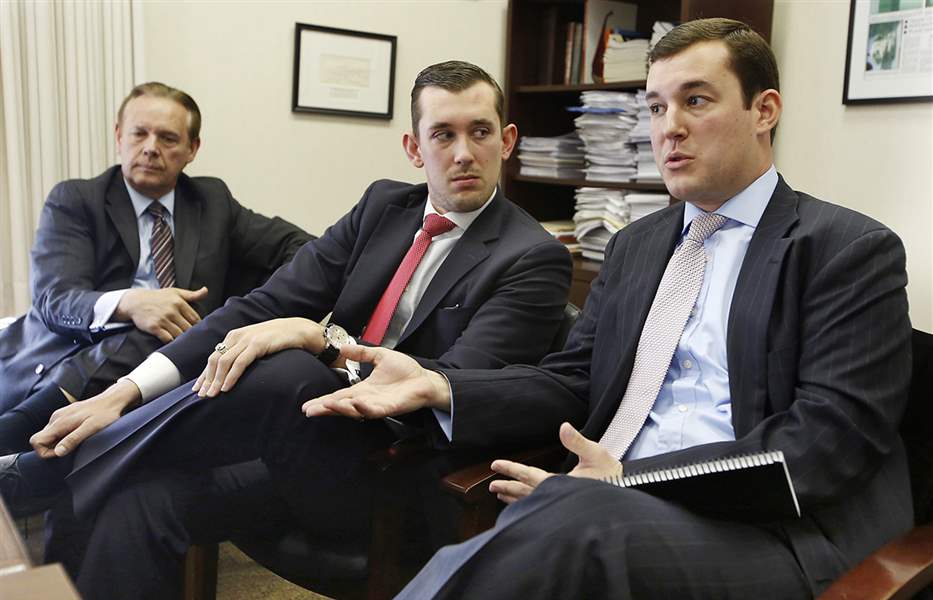
COMMENTARY
Toledo’s renewal needs more than a Michigan roll
Big questions remain about the Treeces’ proposal to privatize Toledo Express: their funding, qualifications, and personal stakes in the project
12/8/2013
Meeting with Blade editors about their proposal to privatize Toledo Express Airport are, from left, Dock Treece and his sons Benjamin Treece and Dock David Treece.
THE BLADE
Buy This Image

Dave Kushma
Ever seen a Michigan roll? No, not the variety of sushi.
You might not know it if you had seen one; that’s the point. A Michigan roll consists of a $100 bill on top of a stack of singles. Someone who waves such a roll under your nose wants you to think he has greater resources than he possesses.
Too many economic development proposals in Toledo in recent years have taken the Michigan-roll approach. Would-be investors, promising scads of new jobs and revenue, seek to persuade us that we somehow have a civic obligation to support their schemes, despite their apparent lack of adequate funding or competence or even much of a business model they’re willing to share with taxpayers.
Nearly three years after the City of Toledo sold a big chunk of Marina District real estate to a Chinese investment firm, the land remains vacant. Mayor Mike Bell says we should be grateful that the unimproved riverfront property is back on the tax rolls, even though taxpayers have coughed up $43 million to prepare the land for redevelopment that has yet to occur.

Meeting with Blade editors about their proposal to privatize Toledo Express Airport are, from left, Dock Treece and his sons Benjamin Treece and Dock David Treece.
There was the proposal last year to convert the abandoned Southwyck shopping mall site in South Toledo to a sports and retail complex, jump-started with investment by the city. That plan collapsed within days of its announcement, after The Blade reported that the lead developer had been sued three dozen times in Lucas County over such things as delinquent taxes and foreclosures.
The latest big deal is the effort by a local family of investment advisers to gain operating control of city-owned Toledo Express Airport, a major public asset built and maintained with tax dollars.
Dock Treece and his sons, Benjamin Treece and Dock David Treece, insist they can operate the Swanton Township airport — and its smaller sibling, Toledo Executive Airport — more efficiently and cheaply than the current managers, the Toledo-Lucas County Port Authority. They also say they are better equipped than the public agency to attract tenants to Toledo Express and unlock its development potential.
“We think we can turn this airport around,” Dock Treece says, “and take the public off the hook.”
After conducting back-channel communications with the Bell administration since last spring, the Treeces are dribbling out some details of their proposal on a Web site, toledoairports.com. But big questions remain about their finances, their qualifications to run the airport, and how they and their associates stand to benefit personally from the project.
Certainly the port authority’s stewardship of Toledo Express leaves much to be desired. Comparable regional airports, such as those in Akron-Canton and Flint, Mich., have weathered the Great Recession better.
Operating losses at Toledo Express — a projected $300,000 this year — require a taxpayer subsidy. Other models of airport management, both private and public, deserve examination. No one would credibly argue otherwise.
Yet before the recession struck, the airport was consistently profitable. Its problems since then are less a product of port authority mismanagement than of global changes in the airline industry: mergers, deregulation, increased reliance on big “hub” airports such as Detroit Metro, new approaches to moving freight. There isn’t much a local operator, private or public, can do to affect these broad trends.
Dock Treece, his two sons, and their lawyer met last week with Blade editors and reporters. They brought a document that they said included their business plan for the airport and a marketability study they commissioned. They tried to condition their release of the report to the newspaper on getting a commitment that our Pages of Opinion would take a more “neutral” stance toward their plan; they say our skeptical commentary has been unfair.
I can understand the Treeces’ thinking; they’ve recruited toadies in local media who are happy to play ball. Still, our response to their offer was thanks, but no thanks (they have since posted the marketability study on their Web site).
At The Blade, news coverage and editorial opinion are, always have been, and always will be utterly separate functions; one does not influence the other. That’s so basic a principle that you’d think anyone with a minimal understanding of public information would grasp it. So the attempted quid pro quo creates doubts about the Treeces’ sophistication in other areas of undertaking the massive public project they propose.
The Treeces are getting support from libertarian absolutists who assert that the family surely would do no worse a job of running the airport than the port authority has done. That position is based largely on the lazy and cynical assumption that private business is intrinsically more efficient than the public sector, and that privatization proposals are automatically owed the benefit of the doubt because of government’s essential incompetence.
Sadly, the recent operating failures of Obamacare lend ammunition to such arguments. But I wonder how many people who rely on Social Security and Medicare to keep them out of poverty would welcome having these programs’ operations handed over to Wall Street and private health insurers.
During our conversation, the Treeces placed greater emphasis on the potential for development of property at and around Toledo Express than they did about improving airport operations. That raises the question of whether they view the airport primarily as a vehicle for land speculation. But our discussion never got that far.
Toledo Mayor-elect D. Michael Collins and City Council would have to approve any change in airport management. Mr. Collins and council members say they’re keeping an open mind about the Treeces’ proposal until they can review its details, once they emerge.
But the onus is not on these elected officials, The Blade, or anyone else to justify keeping operations at Toledo Express in public hands. Those who would tear up that arrangement and assert control must make a compelling public case for change, on the basis of something more than narrow ideology or glittering promises.
Airport privatization remains the exception rather than the rule in this country. No one owes Toledo’s privatization advocates anything more than a hearing appropriate to the credibility of their ideas.
When better times return here — and they will — we won’t want to regret having given away a valuable public asset too quickly and cheaply.
David Kushma is editor of The Blade.
Contact him at: dkushma@theblade.com or on Twitter @dkushma1